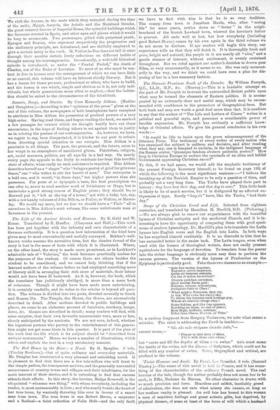Sonnets, Songs, and Stories. By Cora Kennedy Aitken. (Hodder and
Stoughton.)—According to the" opinions of the press" given at tho end of this volume, the newspapers of both hemispheres have conspired to attribute to Miss Aitken the possession of poetical powers of a very high order. Having read these, and begun reading the book, we marked a few passages for extract which we thought hardly bore out these encomiums, in the hope of finding others to set against them to justify us in echoing the praises of our contemporaries. As, however, we have, we regret to say, been disappointed, it is kinder to our poet to refrain from directing special attention to our excerpta. Miss Aitken is a pessimist in all things. The past, the present, and the future, seem to her wmpt in an atmosphere of unrelieved gloom. Patriotism, religion, art, social manners, politics, are all equally in a bad way. On nearly every page she appeals to the Deity to extricate her from this terrible state of affairs, when really no such assistance is required. Miss Aitken describes herself as a " singer " who "brings a poetry of grief for grievous times," one "who writes to stir the hearts of men." The enterprise is a bold one, and it would," in these days," tax higher powers than she possesses. For poets of so dyspeptic a turn, the best proscription we can offer is, never to road another word of Swinburno or Hugo, but to undertake a good strong course of English prose ; they should be, as Boswell put it, "loft at tho top of a tower," not with a baby, but, say, with a few handy volumes of John Milton, or Fuller, or Walton, or Macau- lay. We would say more, but we fear we should have a " Finis " all to ourselves in Miss Aitken's next volume, like some unfortunate man at Inverness in the present.


































 Previous page
Previous page